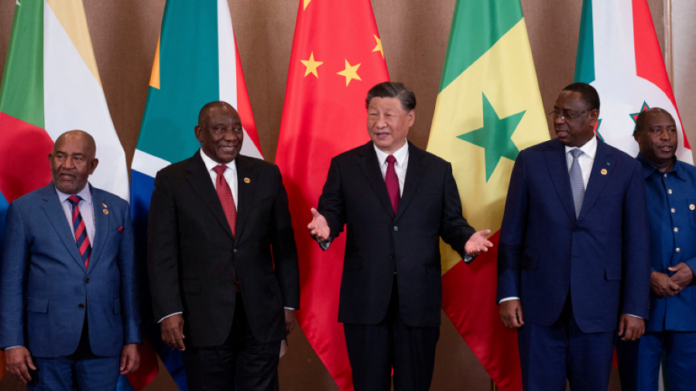The article, “China Escalates Its Political Party Training in Africa” by Paul Nantulya, explores the increasing influence of the Chinese Communist Party (CCP) in shaping political and governance models in Africa. Despite China’s long-standing principle of non-interference in the internal affairs of other nations, recent developments indicate a shift in this approach, particularly concerning Africa. The CCP is actively promoting its dominant party model across the continent through various training programs designed for African party and government officials.
China’s Evolving Strategy in Africa
Historically, China has maintained that it does not export its governance model to other nations. However, the article highlights a significant change in this stance, especially under CCP General Secretary Xi Jinping’s leadership. Xi’s “new model of party-to-party relations” has led to an escalation in the CCP’s training initiatives across Africa, targeting ruling parties and government officials in various countries. This effort aligns with China’s broader strategy of deepening ties with the Global South, particularly Africa, where political party training has become a key tool of influence.
Institutionalizing China’s Governance Model in Africa
One of the most prominent examples of China’s influence is the Mwalimu Julius Nyerere Leadership School, established in 2022. This institution, modeled after the CCP Central Party School, serves as a training ground for members of the Former Liberation Movements of Southern Africa (FLMSA) coalition, which includes ruling parties from Angola, Mozambique, Namibia, South Africa, Tanzania, and Zimbabwe. The school represents a new level of engagement, as it is the first of its kind to cater to multiple African political parties simultaneously, marking a departure from China’s earlier, more localized efforts.
China’s involvement in Africa’s political education is not limited to physical institutions. The CCP has also supported the refurbishment of the Herbert Chitepo School of Ideology in Zimbabwe, a ZANU-PF party school. Additionally, the CCP’s National Academy of Governance, which functions as the external arm of the CCP Central Party School, has established year-round training partnerships with governance academies in countries such as Algeria, Ethiopia, Kenya, and South Africa. These efforts underscore China’s growing role in shaping the governance structures of African nations, with a particular focus on entrenching single, dominant party models.
The Appeal of China’s Political Model
China’s governance model, characterized by party supremacy, fragmented authoritarianism, political meritocracy, and party-led economic governance, is particularly appealing to many African ruling parties. This model emphasizes the dominance of the ruling party over the state and government, a concept that resonates with the leadership of several African nations. The CCP’s training programs often stress the benefits of a strong, centralized party system, which some African leaders view as a means to maintain power and stability without the “messiness” of multiparty democracy.
The article points out that China’s model is attractive to African elites because it offers a template for maintaining political control while pursuing economic development. However, this model is fundamentally at odds with the multiparty democratic systems that many African constitutions and the African Union (AU) conventions endorse. Despite this, the CCP’s governance and party training programs are gaining traction across the continent, with a growing number of African ruling parties seeking Chinese support to solidify their political dominance.
Implications for African Democracy and Governance
The expansion of CCP training in Africa raises significant concerns about the future of democracy on the continent. While China’s economic model has been admired for its success, its political model has not been as widely embraced by African citizens. According to polls, nearly 80 percent of Africans reject one-party rule, preferring instead the democratic systems that many countries adopted during the 1990s. However, the CCP’s influence threatens to undermine these democratic gains by promoting single-party systems that could entrench authoritarian rule.
The article emphasizes the disconnect between the ruling elites in Africa and the democratic aspirations of their citizens. Many African ruling parties are eager to replicate China’s model, seeing it as a way to extend their rule indefinitely. However, this approach is at odds with the desires of the African populace, who overwhelmingly favor democracy. The entrenchment of single-party rule could lead to increased corruption, societal divisions, and instability, as history has shown that autocratic governance often exacerbates these issues.
The Broader Context of China-Africa Relations
China’s increasing involvement in Africa’s political and governance systems is part of a broader strategy to expand its influence on the continent. The CCP’s extensive network of over 3,000 political schools, many of which have established training programs in Africa, reflects the systematic and expansive nature of this effort. The CCP has ongoing relations with 110 African ruling and opposition parties, 35 parliaments, and 59 politically oriented organizations, underscoring the depth of its engagement.
The CCP’s training programs are not just about spreading its governance model; they are also a means of shaping the future leadership of African nations. By targeting younger generations of party and government leaders through scholarships and training programs, China is positioning itself as a key player in the development of Africa’s political landscape. This long-term strategy is likely to have lasting implications for the continent, particularly if the trend towards single-party dominance continues.
Conclusion
China’s escalation of political party training in Africa represents a significant shift in its approach to the continent. By promoting its dominant party model, the CCP is influencing the governance structures of numerous African nations, potentially entrenching authoritarian rule and undermining democratic gains. While this model is appealing to some African ruling parties, it is at odds with the preferences of the majority of African citizens, who continue to favor democracy. As China’s influence in Africa grows, the future of governance on the continent remains uncertain, with significant implications for both political stability and economic development.
















 The African Research (AR) Index is a comprehensive scholarly directory and database focused explicitly on journal publishers that publish and disseminate African research.
The African Research (AR) Index is a comprehensive scholarly directory and database focused explicitly on journal publishers that publish and disseminate African research.

